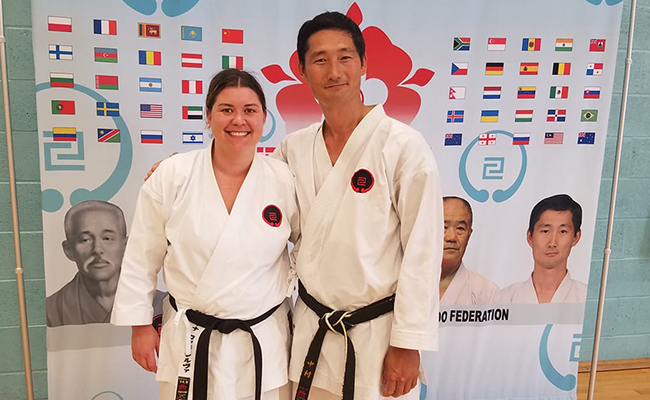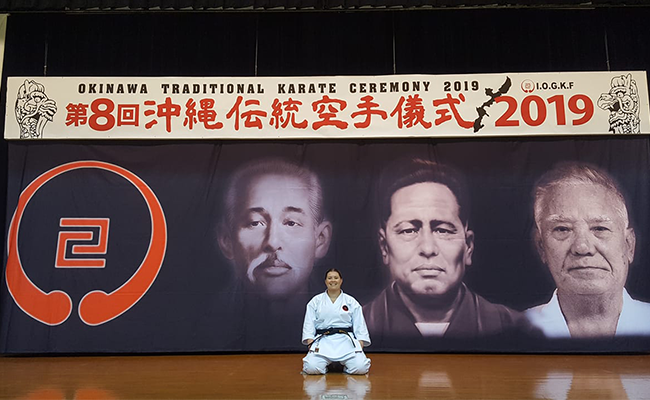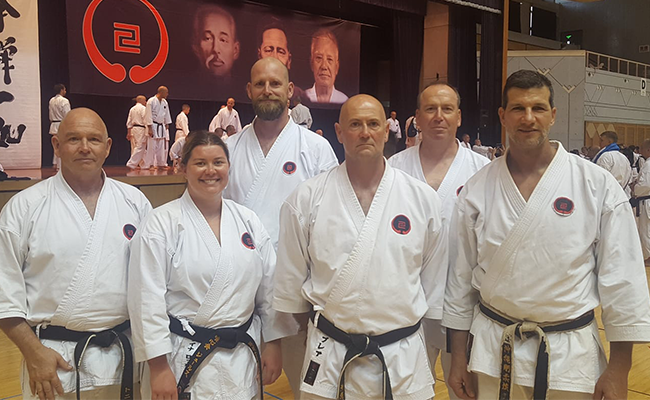 Carolina with the world chief instructor Tetsuji Nakamura in London, 2018
Carolina with the world chief instructor Tetsuji Nakamura in London, 2018
Off-Campus profiles the diverse and inspiring out-of-office pursuits of Otago staff. This week, Senior Lecturer and karate black belt Dr Carolina Loch.
When people ask Dr Carolina Loch if she's had to use her high-level karate skills, the answer can come as a surprise.
“I tell them I use karate every day. Not in the physical sense, but karate teaches you to be composed, to take that that step back. Most of our confrontations as adults are not physical, but tension in the workplace and so on.
“Karate teaches you how to position yourself in those situations. Sometimes I'm going to take a blow here, because it'll be my time to attack next. It's amazing what it does for you outside of the actual karate environment.”
With such a holistic relationship to her martial art, it is little wonder that karate has been an integral part of Carolina's life for more than two decades.
A biologist by training, she grew up in Brazil before moving to Aotearoa New Zealand where she is a Senior Lecturer in the Department of Oral Sciences at the Faculty of Dentistry.
If the name seems familiar, that's because her diverse research interests have a habit of making headlines.
A study of dolphin teeth provided insights into ocean pollution, while a paper she co-authored examining tooth wear in a group of wild Japanese macaques prompted a rethink of human evolution.
 Carolina at a World Gashuku (training seminar) in Okinawa
Carolina at a World Gashuku (training seminar) in Okinawa
Her karate journey began as a teenager when a friend took her to the karate dojo. The friend gave up but Carolina stuck at it, reaching the high rank of brown belt by the time she left Brazil.
She says karate is embedded in her routine and enables her to keep life events in perspective.
“I always tell my students at uni how important it is that they find what their passions are. Most of us need to have something else outside of the work environment to give us balance. When I think about difficult moments in my life, the first place I went after that event was always to a karate class.
“The physical activity side of it is quite nice, but karate and other martial arts also do something else which is this feeling of persistence, of always improving. With karate you've done hundreds of thousands of punches and yet your punch is never perfect.
And it's quite empowering as well in terms of pushing yourself and pushing your limits.
Now a second-degree black belt, Carolina trains at the Otago University Karate Club where professors, lecturers and alumni mix with students. As an experienced martial artist, she enjoys the teaching aspect, demonstrating how body mechanics can defeat brute strength and watching the new students grow in confidence.
 Up to 2000 people from all over the world come together to train in Okinawa.
Up to 2000 people from all over the world come together to train in Okinawa.
Her background was in Shotokan karate, the most popular style worldwide, but the University club practises Okinawan Gōjū-ryū, which translates as 'hard and soft”.
“So you might counteract a hard blow with a soft block. Philosophically, for me, that's quite important to have that balance.”
Being part of the global Okinawan Gōjū-ryū family also gives entry to huge training seminars in karate's spiritual home of Okinawa where up to 2000 people from all over the world come together to train.
“It's one of the best things, I can't even describe the feeling. We were training every day for four or five hours. When I came back to New Zealand, I was so energised. I was super tired physically, but super energised because it's not a competition. It's not like 'I'm better than you', but 'I'm going to help you to improve'.”